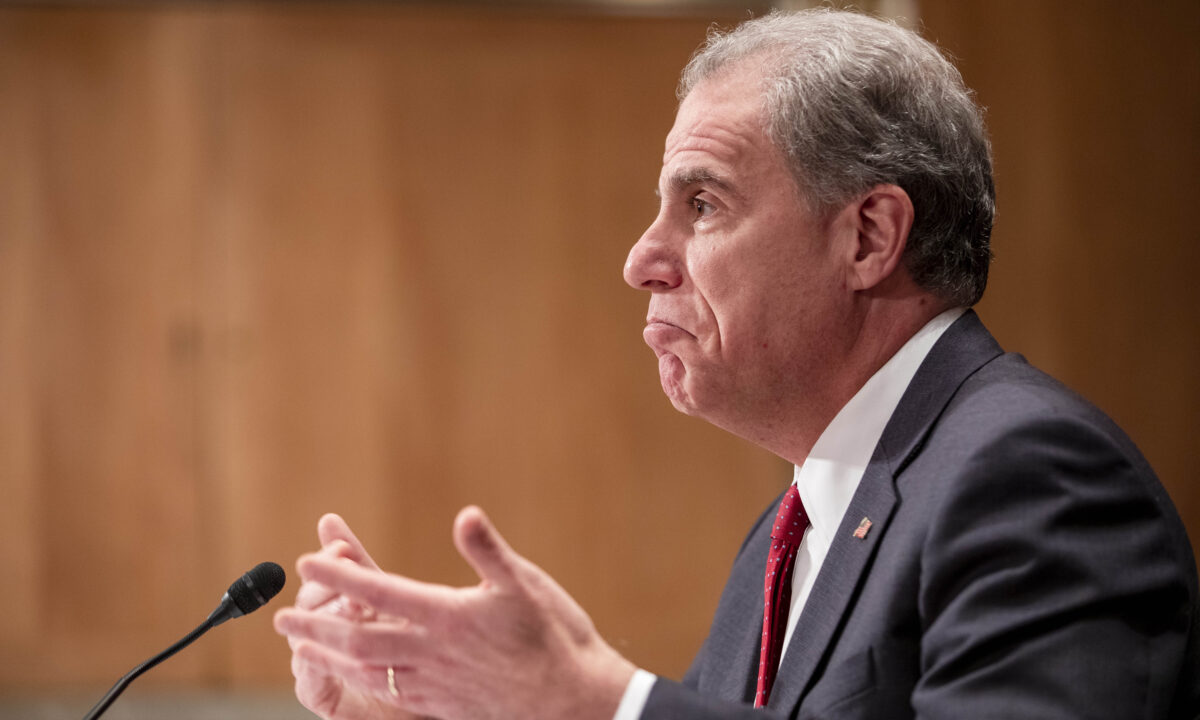


Department of Justice (DOJ) Inspector-General (IG) Michael J. Horowitz wants Congress to upgrade his authority to include investigating allegations of professional misconduct against government lawyers involved in litigation, providing legal advice, and official investigations.
“While the IG has jurisdiction to review alleged misconduct by non-lawyers in the department, it does not have jurisdiction over alleged misconduct committed by department attorneys, including federal prosecutors, when they act in their capacity as lawyers, namely, when they are litigating, investigating, or providing legal advice,” Horowitz told members of the House Appropriations Committee’s Subcommittee on Commerce, Justice, Science and Related Agencies during a March 23 hearing.
Instead of the IG, the DOJ’s Office of Professional Responsibility (OPR) is responsible for assessing such allegations.
“As a result, these types of misconduct allegations against department lawyers, including any that may be made against the most senior department lawyers (including those in departmental leadership positions), are handled differently than those made against agents or other department employees,” Horowitz testified.
“The DOJ IG has long questioned this distinction between the treatment of misconduct by attorneys acting in their legal capacity and misconduct by others, a distinction not made in other federal agencies and a limitation not imposed on any other IG,” Horowitz said.
The IG pointed out that his office has the authority to investigate cases involving allegations of criminal conduct by a federal lawyer while performing official duties or when allegations are made of wrongdoing outside the office.
Horowitz said, “There is no principled reason to send those cases to an office [OPR] that is overseen by the Deputy Attorney General and the Attorney General, whose leader is appointed by them and can be removed by them. I would venture to say that I doubt any member of Congress has ever been seen before you [the appointed head of OPR] to testify publicly.
“I think there is a lack of transparency, and I know from speaking with prosecutors across the country, defense lawyers across the country, and various non-governmental organizations, that their confidence in that oversight ability has been challenged over the years.”
Asked by subcommittee chairman Rep. Hal Rogers (R-Ky.) for examples of problems created by the absent authority, Horowitz said when DOJ lawyers “fail to follow their ethical and professional responsibilities, fail to comply with department policies, or in the courtroom, failing to produce discovery to defendants, whether your talking drug cases or corporate crime, it would go to the OPR.”
Rogers asked Horowitz if not having the authority impacts his office’s ability to conduct effective oversight.
“I think it raises a number of issues. First transparency. The public should know where there have been wayward prosecutors in the department, where there have been wayward lawyers. That transparency is not as robust as it would be with our work.
“Second, accountability. To my mind, transparency goes with accountability. Where you have transparency … transparency is the best disinfectant. If the public knows, if the lawyers in the department know that their misconduct is going to be public, I think that helps reform behavior, and it deters other folks.”
The IG’s inability to investigate allegations of professional misconduct by DOJ prosecutors has been an issue since the passage by Congress of the Inspectors General Act of 1978, signed into law by then-President Jimmy Carter. The DOJ IG is the only one of the 72 statutory IGs that lacks such authority.
Horowitz said the House of Representatives has long supported changing the law to incorporate in the DOJ IG’s authorities coverage of professional misconduct by department lawyers and prosecutors. But opposition to such a change has been blocked by the Senate’s failure to act, he said.
Asked by The Epoch Times if House Judiciary Committee Chairman Jim Jordan (R-Ohio) would support such a change, a Jordan spokesman confirmed that he would support “IG Horowitz asking for new authority to investigate allegations against DOJ lawyers, in effect replacing the Office of Professional Responsibility.”
Giving Horowitz the new authority could put him at the center of an emerging controversy over the failure of the DOJ prosecutors to provide defendants charged with crimes in connection with the January 6 riot at the U.S. Capitol with a video that could potentially change their pleadings.
Had Horowitz had such authority in 2019, his office’s report exposing multiple cases of abuse by FBI officials of the Foreign Intelligence Surveillance Act (FISA) in connection with allegations that employees of former President Donald Trump’s 2016 campaign staff cooperated with members of Russian intelligence against former Secretary of State Hillary Clinton, the Democratic presidential nominee, could have spotlighted professional misconduct that was overlooked by the OPR.
Horowitz was asked by the subcommittee’s top Democrat, Rep. Matt Cartwright (D-Pa.), what impact would result on his office if Congress reduces federal spending to 2022 levels, as House Republicans have advocated.
The impact of such cuts, Horowitz replied, would be “overwhelmingly significant” and would reduce his annual budget from its present $149 million to $128 million. Since 80 percent of the IG’s budget goes to personnel costs, he would have to stop filling positions vacated by staff retirements or departures and reduce the ability of IG investigators and auditors to travel to sites and facilities vital to the completion of their work.
Asked by Rep. Ben Cline (R-Va.) if he is prepared to launch an investigation in response to a House Judiciary Committee report that the DOJ’s classification of nearly two dozen alleged instances of “domestic terrorism” by parents appearing before local school boards, Horowitz said he is reviewing the report but has not made a decision on further action.
